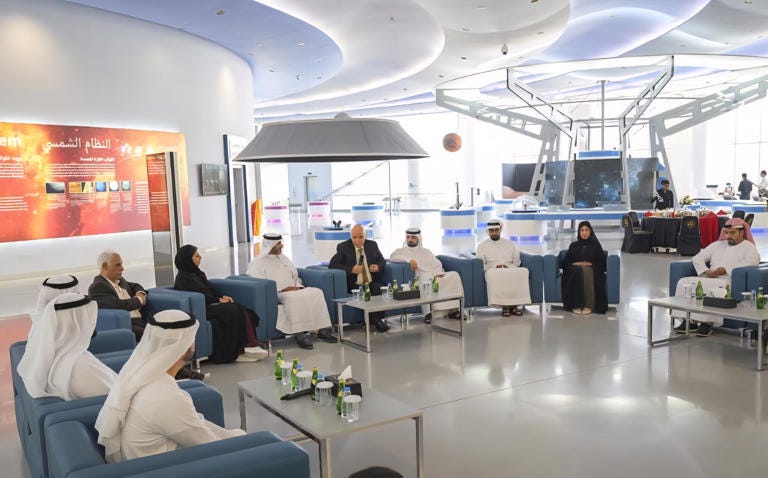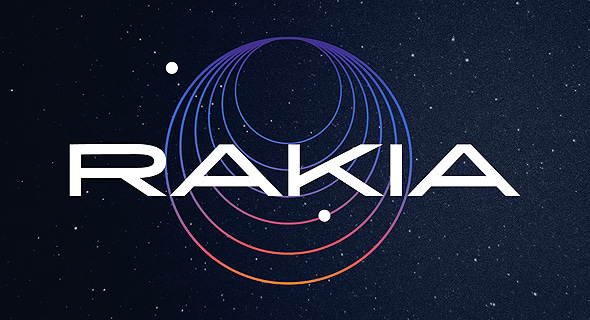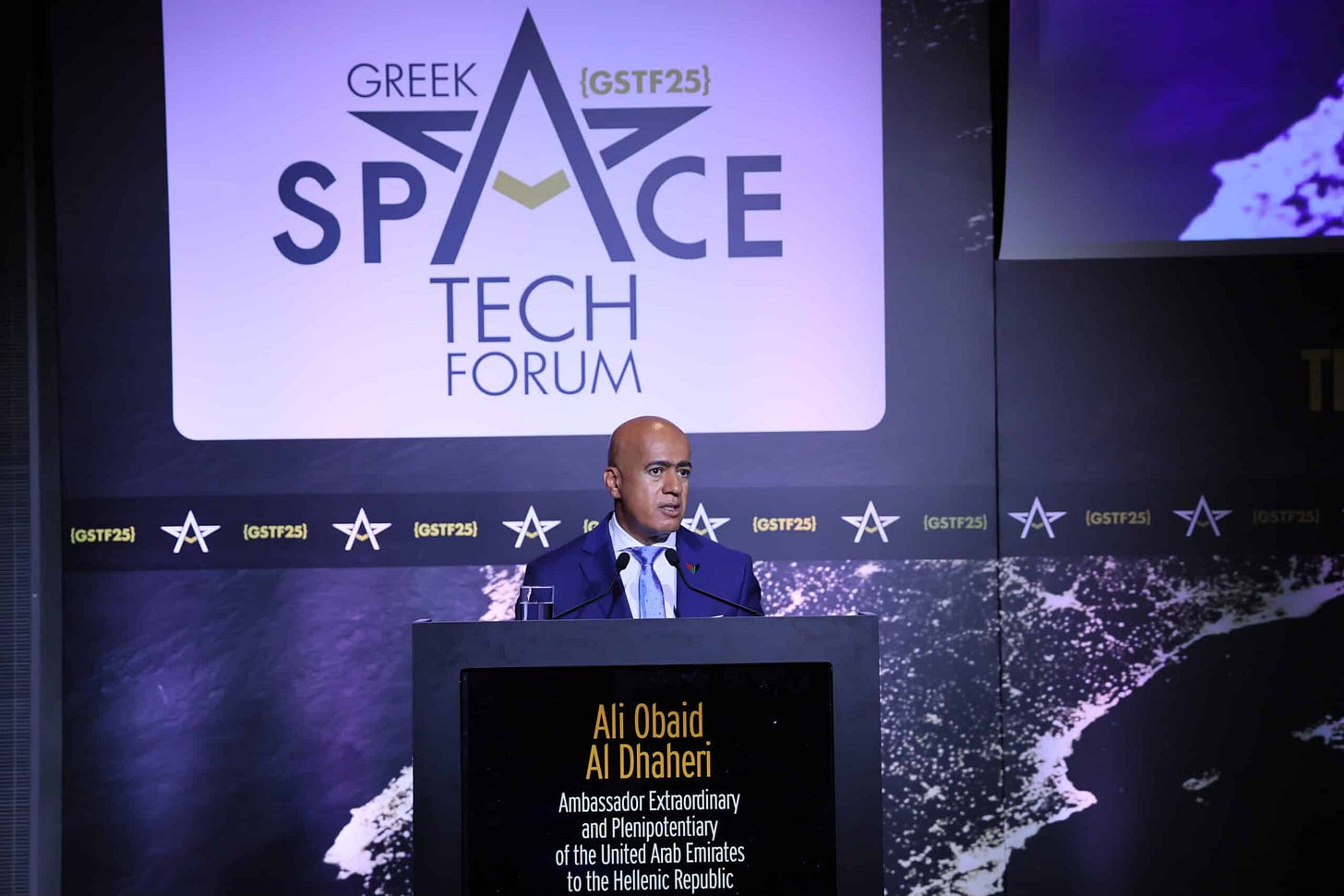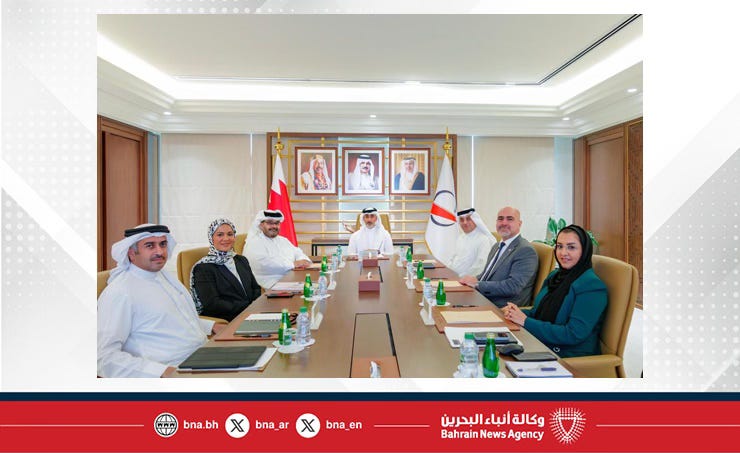Middle East Space Roundup: 30 June to 6 July 2025
A summary of all the space news in the Greater Middle East over the past week, brought to you by AzurX


The following are the major space developments in the Greater Middle East region tracked by Middle East Space Monitor over the past week:
Israel Space Developments
Israel’s Space-Based ISR Dominance Over Iran Contributed to Operational Military Success
Israel’s defense ministry has revealed that its satellite constellation, including the advanced Ofek 13 radar satellite, captured over 12,000 high-resolution images and monitored hundreds of thousands of square kilometers of Iranian territory daily during recent hostilities. This marked a strategic leap from episodic observation to real-time, persistent surveillance, enabling immediate battle damage assessments and dynamic adjustment of Israel Air Force operations based on Iran’s missile activity. The Ofek 13, jointly developed with IAI and launched in 2023, underscores Israel’s growing space-based ISR (Intelligence, Surveillance, Reconnaissance) dominance and operational integration.
Israel, France, Launch C³IEL Satellite Mission to Study Cloud Systems
Israel and France have launched the Cluster for Cloud evolution, ClImatE and Lightning (C³IEL) mission - an ambitious binational satellite project led by the Israel Space Agency (ISA) and the Centre national d'études spatiales (CNES) - to revolutionize climate science by using dual nanosatellites to capture high-resolution, multi-angle imagery of convective cloud systems. Scheduled for launch in 2028, the mission will provide 3D imaging of cloud growth and dynamics, linking cloud formation, water vapor, and lightning activity. With leading Israeli academic institutions and French research labs involved, C³IEL aims to reduce critical uncertainties in weather prediction and climate change modeling, positioning small satellite constellations as powerful tools for atmospheric science.
Israel’s SatixFy Communications Fully Acquired by Canada’s MDA Space
Canada’s MDA Space has completed its $280 million all-cash acquisition of Israel-based SatixFy Communications, significantly expanding its in-house satellite communications capabilities. The deal, which exceeded MDA’s original bid due to a competitive “go-shop” process, will fully integrate SatixFy’s advanced chipsets, digital beamforming technology, and terminal solutions into MDA’s Satellite Systems division. This move strengthens the technological backbone of MDA’s Aurora platform, critical to the Telesat Lightspeed constellation, and reflects a broader strategy to secure proprietary digital payload components amid intensifying global competition in space-based communications.
Israel’s Rakia Mission Experiment Continues With Axiom Mission 4 On the ISS
Axiom Space’s Ax-4 mission, which docked with the ISS on 26 June 2025, continues to showcase Israel’s growing role in private spaceflight through the Rakia Mission initiative. Led by Prof. Yoav Yair of Reichman University, an Israeli experiment on high-altitude lightning phenomena - originally developed for Ilan Ramon’s ill-fated Columbia flight - is being conducted for a fourth time aboard an Axiom mission. Supported by the Rakia Mission public benefit corporation, the project provides real-time storm tracking data to astronauts to photograph sprites and other rare electrical events. The experiment reflects Israel’s sustained scientific presence in orbital missions and its expanding collaboration, including advisory roles to new space actors like Hungary and India.
Israel’s 2019 Beresheet Lunar Lander: Are the Tardigrades Still Alive on the Moon?
The fate of microscopic tardigrades sent to the Moon aboard Israel’s Beresheet lunar lander in 2019 remains scientifically uncertain following the spacecraft’s crash, but speculation persists that some may have survived in a suspended, dehydrated state. Originally included in a digital time capsule as part of an Israeli initiative to preserve human knowledge and biological material, the tardigrades' extreme resilience to radiation, vacuum, and temperature swings has fueled debate about their survivability. While unlikely to be “alive” in any functional sense due to the Moon’s lack of water and nutrients, the Beresheet incident continues to underscore Israel’s unexpected role in one of space biology’s most curious open questions.
Saudi Arabia Space News
Saudi Arabia Commits to Digital, Satellite Connectivity at UN Broadband Commission
At the UN Broadband Commission’s 15th anniversary meeting, Saudi Arabia reaffirmed its commitment to inclusive digital development and highlighted its strategic investments in satellite-based connectivity. CST Acting Governor Eng. Haytham Al Ohali emphasised the Kingdom’s growing role in deploying non-terrestrial networks, including low-Earth orbit (LEO) satellites and High Altitude Platform Systems (HAPS), to bridge connectivity gaps in underserved regions. Al Ohali also underscored Saudi Arabia’s alignment with the ITU’s Connect 2030 agenda and noted ongoing collaborations on satellite-linked infrastructure to support sustainable, affordable internet access across the Global South.
Saudi Arabia Participates in the 68th UN COPUOS Session in Vienna
At the 68th session of the UN Committee on the Peaceful Uses of Outer Space (COPUOS), Saudi Arabia underscored its commitment to international cooperation, sustainability, and orbital safety. Led by the Saudi Space Agency, the Kingdom hosted a workshop on space debris and announced the 2026 Space Debris Conference, while also engaging in bilateral meetings to deepen global partnerships. This active diplomatic and technical engagement reflects Saudi Arabia’s broader ambition to shape global space governance in alignment with Vision 2030.
Saudi Arabia’s CST Releases 2025-2027 Spectrum Outlook, Includes Satellite Spectrum Priorities
Saudi Arabia’s Communications, Space & Technology Commission (CST) has released its 2025–2027 Spectrum Outlook, setting strategic priorities for spectrum use that prominently include satellite services. Notably, the Outlook designates the 28 GHz band for satellite operations and outlines regulatory frameworks to support Non-Terrestrial Networks (NTNs), including satellite-based communications and advanced air mobility. By aligning with international best practices and promoting flexible access models, the CST aims to accelerate satellite integration alongside emerging 5G and wireless technologies, reinforcing the Kingdom’s ambition to lead in next-generation connectivity and space-based innovation.
Saudi Arabia Advances Military Space Talks With France’s ArianeGroup
Saudi Arabia’s strategic partnership talks with France’s ArianeGroup on space-based defense systems remain active but have slowed as Riyadh recalibrates its defense priorities and fiscal planning for 2026, according to Tactical Report. While technical consultations and system architecture reviews have progressed - including designs for maneuverable satellites and secure inter-satellite links - final decisions on prototype development and integration with Saudi missile defense systems are deferred pending budget approval. The deal, still on track for a mid-2026 framework agreement, reflects the Kingdom’s evolving commitment to building orbital defense capabilities alongside traditional military modernization efforts.

Saudi Arabia’s Homeland Protectors Ltd. to Help Nigeria Build Satellites & Drones
Nigeria has taken a significant step toward defence self-sufficiency through a new partnership between the Defence Industries Corporation of Nigeria (DICON) and Saudi Arabia-based Homeland Protectors - a previously unkown company, enabling local production of drones, satellite systems, and advanced communications equipment. The agreement, signed in Kaduna, positions Nigeria to not only meet domestic security demands but also become a regional exporter of high-end defence technologies. This move reflects Abuja’s broader strategy to localise strategic capabilities, reduce dependency on imports, and assert greater industrial leadership within Africa’s security landscape.
Saudi Space Agency Announces New Prize to Recognize NGO Contributions to Space Sector
The Saudi Space Agency has launched the Madar Al-Athar Award to recognize innovative contributions from non-profit organisations in the Kingdom’s space sector. Aligned with Vision 2030, the award aims to foster scientific excellence, social impact, and sustainable growth through pioneering initiatives. It forms part of a broader effort to elevate Saudi Arabia’s global standing in space, complementing other programmes such as Madak Space and national science outreach campaigns. Entries are open until 30 September 2025, with winners to be announced in December 2025.
Iran Space Developments

Report: Iran’s Space Program Largely Spared from Israeli, U.S. Strikes…For Now
Amid escalating regional tensions, Iran’s growing space program remains intact - for now - despite targeted Israeli and U.S. strikes on other strategic assets. While Tehran insists its rockets are limited in range and primarily for civilian purposes, U.S. defense officials and analysts increasingly view Iran’s satellite launches and life-support-capable capsules as potential precursors to intercontinental ballistic missile (ICBM) development. With Russia now a key launch partner following its diplomatic isolation, Iran's access to advanced space infrastructure has expanded. Though not yet directly targeted, Iran’s space facilities may soon draw closer scrutiny as concerns mount over dual-use technology and strategic intent.
Iran Leveraging China’s BeiDou Encrypted Military Grade PNT Signals
Iran’s strategic shift from the U.S.-controlled GPS to China’s BeiDou satellite navigation system marks a quiet yet profound realignment in positioning, navigation, and timing (PNT) infrastructure, with major implications for regional deterrence and global tech sovereignty. Now leveraging BeiDou’s encrypted, military-grade signals, Iran has enhanced the precision of its missile and drone capabilities - evident in its April 2024 strikes on Israel - and is extending this independence across civilian sectors. This pivot not only erodes a long-standing U.S. point of control but signals Iran’s integration into China’s “Space Silk Road,” accelerating a multipolar satellite regime that challenges Western dominance in the orbital domain.
Iran: Iranians Caught Using Starlink Face Imprisonment and Flogging
Iran’s parliament has voted to criminalize the use of Elon Musk’s Starlink service, citing national security threats in the wake of U.S. and Israeli strikes. The legislation, which imposes severe penalties including imprisonment and flogging, underscores Tehran’s alarm over Starlink’s role as a resilient communications lifeline during internet blackouts. By targeting Starlink, Iran is signaling the rising strategic significance of commercial satellite networks in modern conflict and information warfare - particularly when such platforms empower dissent and challenge authoritarian control over digital space.
Starlink in Iran: The Growing Geopolitical Influence of Commercial Space Systems
Elon Musk’s Starlink network is reportedly playing a growing role in U.S. efforts to enable secure communications in adversarial environments, with recent reports alleging that thousands of Starlink terminals have been covertly deployed inside Iran to support anti-regime activities. The move aligns with Washington’s broader strategic use of Starlink in contested zones, including Ukraine, and reflects Musk’s deep and longstanding ties to the U.S. national security establishment. While lauded by some as advancing internet freedom, these operations raise complex questions about the geopolitical influence of commercial space systems, their use in irregular warfare, and the blurred lines between private sector innovation and state-backed regime change strategies.
Iran Launches Space Sector Training & Education Program for BRICS Countries
Iran has launched a strategic space-sector training program targeting students from BRICS countries to bolster its domestic research capacity and reduce reliance on Western academic networks amid ongoing sanctions. Coordinated by the Iranian Space Research Centre (ISRC), the initiative offers 32 academic positions across leading Iranian universities in satellite systems, propulsion, and signal processing. Analysts view the program as a calculated move to mitigate brain drain, fill technical skill gaps, and revitalise Iran’s aerospace sector, particularly as the country faces delays in satellite deployments and seeks greater resilience through international scientific collaboration.
UAE Space News

UAE Space Agency and SAASST Deepen Strategic Ties for Space Science
The UAE Space Agency and the Sharjah Academy for Astronomy, Space Sciences, and Technology (SAASST) have deepened strategic ties following a high-level visit focused on enhancing collaboration in space science, engineering, and computing. The discussions centred on activating existing agreements, launching applied research projects, and aligning academic programmes with the UAE’s National Space Strategy. The visit underscored a growing model of federal-academic integration aimed at empowering young talent, strengthening research capabilities, and advancing the UAE’s ambition to become a global leader in space exploration and innovation.
UAE and Brazil Discuss Satellite Communications Cooperation, Investments
During the BRICS Summit meeting in Brazil on 5 July 2025, Brazilian President Lula da Silva and Abu Dhabi Crown Prince Sheikh Khaled bin Mohammed bin Zayed discussed expanding bilateral cooperation across strategic sectors, notably including satellite communications. President Lula identified satellite systems - alongside submarine cables and AI - as priority areas for foreign direct investment, signaling Brazil’s intent to deepen technological and digital infrastructure ties with the UAE. The discussion also reinforced both countries' shared commitment to multilateralism, climate action, and advancing a multipolar world order.
Brazil’s GlobalSat Shows its SATCOM Products at UAE’s Middle East Rail 2025
Brazil’s Globalsat Group reinforced its regional positioning by showcasing its satellite, hybrid, and Direct-to-Device (D2D) solutions at Middle East Rail 2025 in Dubai, UAE, focusing on mission-critical communications for remote and resilient rail operations. Executives Flávio Franklin and Marcelo Sturmann used the event to highlight successful deployments in Latin America and to explore strategic partnerships with government and tech leaders across MENA and Southeast Asia. As a leading MSS provider with a strong ESG orientation, Globalsat continues to expand its influence in mobility, infrastructure resilience, and smart transport systems through satellite-enabled innovation.
UAE Ambassador: UAE Committed to Space Diplomacy and Global Cooperation
Speaking at the 2nd Greek Space Tech Forum, UAE Ambassador to Greece Ali Obaid Al Dhaheri outlined the UAE’s rapid ascent as a global space power, highlighting over $10 billion in investments, 25+ satellite launches, and major achievements such as the Hope Mars Mission and the MBZ-SAT Earth observation satellite. He emphasized the strategic role of the UAE’s $820 million National Space Fund and Space Economic Zones in advancing national capabilities, fostering public-private collaboration, and attracting international partners. Al Dhaheri’s remarks reinforced the UAE’s commitment to space as a pillar of scientific diplomacy, regional leadership, and global cooperation.
UAE’s Mohammed Bin Rashid Space Centre Open Registration for 2025 Summer Space Camp
The UAE’s Mohammed Bin Rashid Space Centre (MBRSC) has opened registration for its 2025 Summer Space Explorer Camp, a strategic youth education initiative aimed at inspiring Emirati students aged 12–14 to pursue careers in space science, satellite technology, and robotics. Through hands-on experiments and mentorship from MBRSC engineers, participants will explore the UAE’s current missions and human spaceflight efforts, reinforcing national goals to develop indigenous talent and strengthen the UAE’s long-term position in the global space sector.
Türkiye Space Developments
Türkiye Starts Development of its BKZS Regional GNSS Satellite Program
Türkiye is advancing its strategic autonomy with the development of the Bölgesel Konumlama ve Zamanlama Sistemi (BKZS - Regional Positioning and Timing System in English), a regional satellite navigation and timing system central to its 2030 Industry and Technology Strategy. Aimed at reducing reliance on foreign GNSS like GPS, BKZS combines national security imperatives with economic ambition. Anchored by domestically developed atomic clocks and a CubeSat demonstration mission, the system will evolve into an eight-satellite constellation serving military and civilian users. Embedded within Türkiye’s broader space agenda - alongside lunar exploration and Baykar’s Fergani Space GNSS constellation - BKZS positions Türkiye as a serious regional player in sovereign PNT infrastructure, aligning with global trends toward national GNSS systems.
Türkiye’s Plan-S Deploys Connecta IoT Satellite Network to Azerbaijan
Turkish satellite company Plan-S has successfully deployed its Connecta IoT Network in Azerbaijan through a partnership with Azercosmos and smart systems provider Elsmart, marking one of its first international field integrations. The initiative uses Plan-S’s growing 12-satellite constellation to transmit IoT data from Elsmart’s sensors, proving satellite-enabled digital transformation is viable even in infrastructure-poor regions. This milestone reflects Plan-S’s broader strategy to combine space-based connectivity, local technology partnerships, and digital inclusivity to support sustainable tech ecosystems across friendly countries.
Jordan Space News
Jordan Selected by UNOOSA-Exolaunch to Build & Launch its First CubeSat
Jordan has been selected to launch its first CubeSat under the UNOOSA–Exolaunch “Access to Space for All” initiative, marking a significant milestone in the country’s emerging space ambitions. Developed by Al Hussein Technical University, the satellite will support conservation efforts by enabling real-time wildlife tracking in remote reserves, while simultaneously building national expertise in satellite design, telemetry, and ground station operations. This mission signals Jordan’s strategic entry into the space sector and reflects a broader commitment to leveraging space technology for sustainable development and national capacity building.
Jordan’s Integration With U.S. SBIRS Early Warning Satellite Beneficial During Recent Israel-Iran Conflict
Jordan’s integration with the U.S. Space-Based Infrared System (SBIRS) has significantly enhanced its missile threat detection and airspace sovereignty, as demonstrated during the recent Iran-Israel confrontation. The system enabled immediate alerts when Iranian missiles were launched, allowing Jordanian authorities to issue timely public safety instructions. This collaboration underscores the strategic value of space-based early warning systems like SBIRS in bolstering regional defense, particularly for frontline states navigating rising tensions and asserting control over their airspace.
Oman Space Developments
Oman’s Etlaq Spaceport to be Operational for Orbital Launches by 2027
Oman is positioning itself as a regional hub for space access, leveraging its equatorial proximity and Indian Ocean coastline to attract international launch ventures. The Etlaq Spaceport, led by NASCOM and operational by 2027, offers multi-orbit capabilities from its 18° latitude location and has already enabled the region’s first experimental launch. Backed by Oman’s Ministry of Transport, Communications and Information Technology (MTCIT), the initiative integrates workforce development and infrastructure expansion - including new launch and assembly facilities - aimed at securing foreign investment and advancing national capabilities in line with Oman Vision 2040.
Oman Imposes Temporary Maritime Restrictions for Duqm-2 Suborbital Launch
Oman’s Ministry of Agriculture, Fisheries and Water Resources has imposed temporary maritime restrictions along Al Wusta’s coastline to facilitate the Duqm-2 experimental rocket launch, led by Etlaq Spaceport in partnership with New Zealand’s Stellar Kinetics. Scheduled for 6, 8, and 9 July 2025, the launch aims to validate safety protocols and operational procedures, marking a critical milestone in Oman’s efforts to develop a regulatory and infrastructural foundation for future space activities and positioning Duqm as a prospective regional hub for orbital and sub-orbital launches.
Other Regional Space News
BRICS Member States - Including Egypt, Iran, & UAE - Form BRICS Space Council
BRICS member states, including Egypt, Iran, and the UAE, have reached a preliminary agreement to establish a BRICS Space Council, according to the group’s latest summit declaration. The Council aims to deepen intra-group cooperation in space activities and address disparities in space capabilities among members. This move underscores BRICS’ strategic intent to develop a more balanced and collaborative approach to space exploration and peaceful space use, reinforcing the bloc's commitment to technological sovereignty and multipolar space governance.
Bahrain Space Agency Convenes Quarterly Board Meeting to Review Space Activities
The Bahrain Space Agency’s board convened its Q2 meeting, chaired by Deputy National Security Advisor Shaikh Khalid bin Ali Al Khalifa, to review strategic progress and affirm the Kingdom’s growing space ambitions. Highlights included celebrating Shaikha Hessa bint Ali Al Khalifa’s historic appointment as Second Vice-Chair of COPUOS and reviewing key projects under the 2024–2028 strategic plan. The board underscored Bahrain’s commitment to capacity-building, international engagement, and aligning national space efforts with broader security and development goals.
U.S. Embassy in Morocco Launches Funding Opportunity for U.S.-Moroccan Space Initiatives
The U.S. Embassy in Morocco has launched a funding opportunity of up to $70,000 for space-themed educational projects aimed at promoting American space leadership and STEM innovation among Moroccan youth. Eligible U.S. and Moroccan non-profits and educational institutions are invited to propose immersive workshops, competitions, and training initiatives that highlight U.S. achievements in space and foster STEM skills and leadership in at least 80 students aged 15-18 over 12 months. This initiative reinforces science diplomacy and the soft power role of U.S. space programs in youth engagement abroad.
Azerbaijan’s Azercosmos Sees Further Decline in Satellite Revenue
From January to May 2025, Azerbaijan’s Azercosmos generated $7 million in satellite telecommunications service exports to 40 countries—down 11.4% year-on-year—yet still accounting for 65% of the agency’s total revenue. Key markets included the UK, Luxembourg, Nigeria, Türkiye, and Egypt. Despite the dip, the figures highlight Azercosmos’ continued reliance on international clients and its strategic role in Azerbaijan’s export portfolio.
Be sure to catch up with space activities in the region in the next edition of Middle East Space Monitor’s space roundup!
Middle East Space Monitor is an official Media Partner of the Space Defense and Security Summit and World Space Business Week 2025, hosted by Novaspace in Paris











